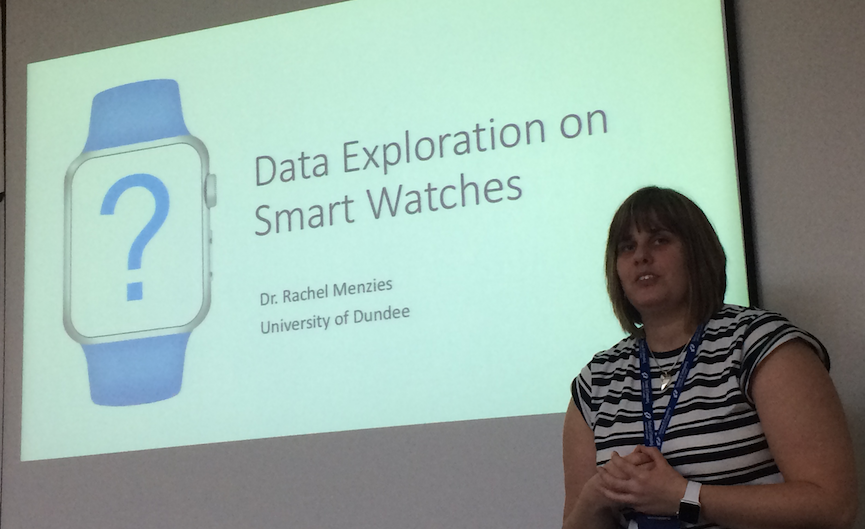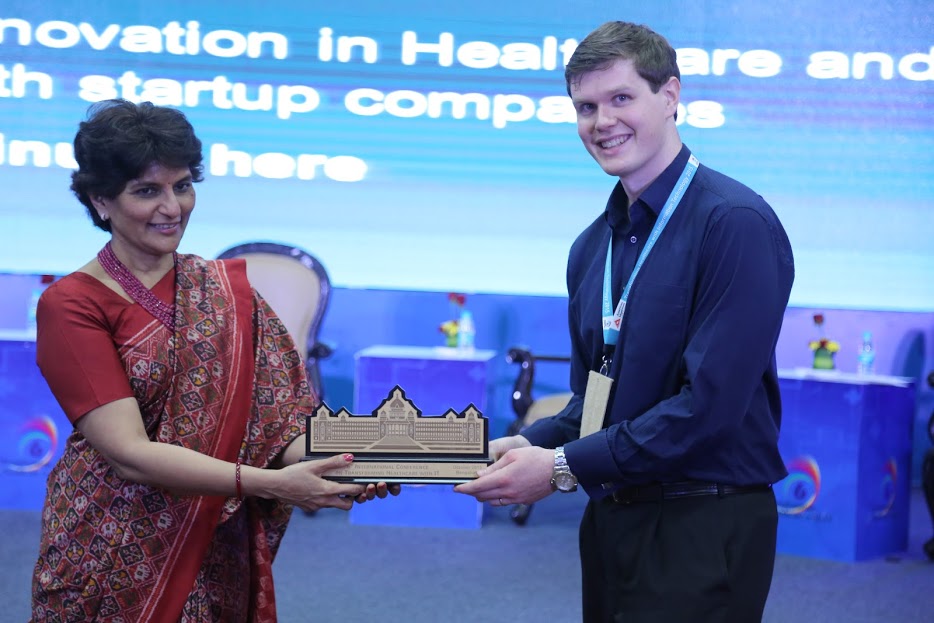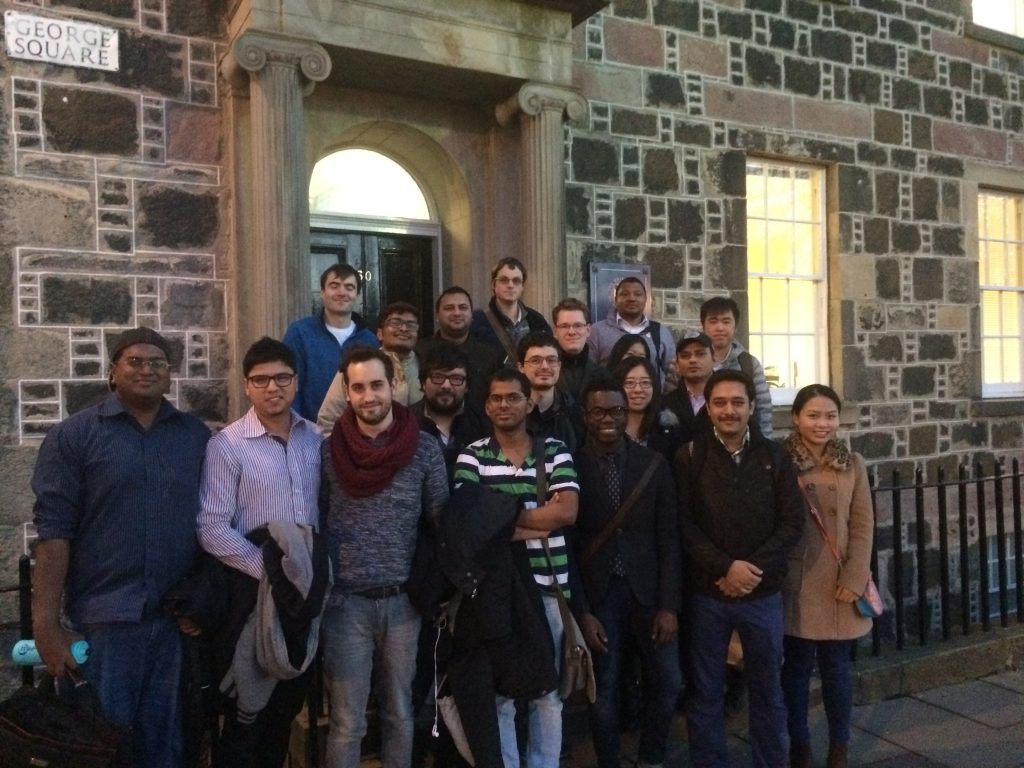Abstract
Visualising dynamic graphs is important for many application areas. For social media networks, they can help us understand the interaction and interests of users online. In biology, they can illustrate the interactions between genes and biological processes. Understanding and designing effective visualisation methods for dynamic network data is fundamental to these areas as well as many others. In this talk, we focus on the effective presentation of dynamic networks. In particular, we summarise recent results on dynamic graph visualisation with respect to animation (presentation of interactive movies of the data), small multiples (presenting the data through several linked windows like a comic book), and drawing stability (the visual stability of the data presentation). We conclude with some recent work on scalable graph visualisation and in the visualisation of sets and their intersections.
MORE
News

Abstract
In this talk I will present experiences and insights from our studies involving locative media, local history and community. Our work in the village of Wray has involved the longitudinal and ‘in the wild’ deployment of ‘digital noticeboard’ displays (conceived as technology probes) that support the sharing of photos/images. A significant portion of the submitted photo content relates to Wray’s local history and features of Wray’s landscape. Residents of the village have helped shape the system through involvement in co-design workshops. A key motivation of our current studies (as part of the SHARC project) is to explore issues around the co-curation of locative media experiences. A field trial (involving both residents and visitors) and a design workshop revealed both opportunities and challenges for the co-curation approach.

Abstract
Most experiences in life are punctuated by a closure experience. In the past these were profound; however, over generations we have distanced ourselves from meaningful closure experiences thanks to our lifestyles increasing in comfort, the church weakening and medicine advancing.
This has seemingly freed us from the shackles of the ultimate closure experience – death – and sanctioning our personal pursuit of heaven on earth in the form of consumption. We are now encouraged to drunkenly stumble from purchase to purchase, with any sense of longevity and responsibility removed.
Long term side effects of this are exampled in the Product, Service and Digital landscapes that we frequent. The consequences of our behaviour results in a changing climate, industries fined billions for mis-selling and individuals casually eroding their personal online reputations.
Many of us are active in the creation of services, products or digital products; making them attractive, engaging and usable for consumers, but we often overlook concluding these experiences for the user in a responsible way. Closure Experiences offers a model to frame this change.
Bio
Joe Macleod has been working in the mobile design space since 1998 and has been involved in a pretty diverse range of projects. At Nokia he helped develop some of the most streamlined packaging in the world, he created a hack team to disrupt the corporate drone of powerpoint, produced mobile services for pregnant women in Africa and pioneered lighting behavior for millions of phones. For the last four years he has been key to establishing ustwo as the UKs best digital product studio, with 180 people globally in London, New York, Sydney and Sweden, while also successfully building education initiatives, curriculums and courses on the back of the IncludeDesign campaign which launched in 2013. He now works independently on projects and has recently established established Closure Experiences, a new business looking at issues around consumption, consumerism and designing the end of things.
Abstract
 For many of us, interacting with data on mobile devices such as phones and tablets is commonplace in our lives, e.g. phone call data, TV guide, maps, fitness and wearable data. With the introduction of smart watches, the screen size of mobile devices has dramatically decreased. This reduction in screen real estate provides challenges for the design of interfaces, including the presentation and exploration of data visualisations. Using bar charts as an example, this presentation will explore the shortcomings of current zooming techniques on very small screens and consider proposed guidelines for the development of simple data exploration applications. Key design features such as the need for overview and context will be considered in respect to a simple and effective data exploration task.
For many of us, interacting with data on mobile devices such as phones and tablets is commonplace in our lives, e.g. phone call data, TV guide, maps, fitness and wearable data. With the introduction of smart watches, the screen size of mobile devices has dramatically decreased. This reduction in screen real estate provides challenges for the design of interfaces, including the presentation and exploration of data visualisations. Using bar charts as an example, this presentation will explore the shortcomings of current zooming techniques on very small screens and consider proposed guidelines for the development of simple data exploration applications. Key design features such as the need for overview and context will be considered in respect to a simple and effective data exploration task.
Biography
Rachel Menzies is a lecturer and Head of Undergraduate Studies (Computing) at the School of Science and Engineering at the University of Dundee. Her research interests include user centred design with marginalised user groups, such as users with disabilities, as well as exploring novel interfaces, data visualisation and CS education. Rachel is an Accessibility and Usability Consultant with the Human Centred Computing Consultancy, run by the University of Dundee, and has worked for many large international clients as well as providing bespoke training sessions to small companies.
San Francisco, CA, USA, 27th February 2016.
Submission due date: 22nd December 2015 (notifications in time for early registration), or 8th January 2016.
https://collocatedinteraction.wordpress.com/
ABSTRACT
In the 25 years since Ellis, Gibbs, and Rein proposed the time-space taxonomy, research in the ‘same time, same place’ quadrant has diversified, perhaps even fragmented. The goal of this one-day workshop is to bring together researchers with diverse, yet convergent interests in tabletop, surface, mobile and wearable technologies, and those interested in the social aspects of interaction, such as conversation analysis and ethnomethodology. These communities have matured considerably, and produced significant exemplars of systems, methods, and studies concerned with collocated interactions. Yet, new challenges abound as people wear and carry more devices than ever, creating fragmented device ecologies at work, and changing the ways we socialise with each other. In this workshop we seek to start a dialogue to look back as well as forward, review best practices, discuss and design paper-prototypes using the collocated design framework, to consider how we might address new and future challenges through collocated design practice.
MORE
Tangible Data, explorations in data physicalization @ TEI’16 Eindhoven 14th & 16th Feb 2016
http://dataphys.org/workshops/tei16/
Call for Participation
We are pleased to announce our studio-workshop “Tangible Data, Explorations in Data Physicalization”, which will take place at TEI’16 in Eindhoven on the 14th and 16th February 2016. This workshop addresses both experienced researchers and practitioners as well as those who are new to the field but interested in applying Data Physicalization to their own (research) practice. The workshop will provide opportunities for participants to explore Data Physicalization hands-on, by creating their own prototypes built with tangible media including digital fabrication technologies. These practical explorations will lead into reflective discussions on the role tangibles and embodiment play in Data Physicalization and the future research challenges for this area.
MORE
- San Jose, CA, USA
- 7th May 2016
- Submission due date: 8th January 2016
https://proxemicmci.wordpress.com/
ABSTRACT
Recent research on mobile collocated interactions has been looking at situations in which collocated users engage in collaborative activities using their mobile devices. However, existing practices fail to fully account for the culturally-dependent spatial relationships between people and their digital devices (i.e. the proxemic relationships). Building on the ideas of proxemic interactions, this workshop is motivated by the concept of ‘proxemic mobile collocated interactions’, to harness new or existing technologies to create engaging and interactionally relevant experiences. Such approaches would allow devices to not only react to presence and interaction, but also other indicators, such as the interpersonal distance people naturally use in everyday life.
MORE
On Thursday a large proportion of the SACHI lab and many in the School of Computer Science department headed South to Edinburgh’s SICSA Demofest. The Demofest is a yearly meeting of the Scottish Computer Science community in which students and academics showcase the latest research to a varied audience of industry and academics.
<!–Speaker: Andrew Manches, University of Edinburgh
Date/Time: 2-3pm November 24, 2015
Location: CS1.33a, University of St Andrews–>
Abstract:
Most of us might agree that ‘hands-on learning’ is good for children in the early years. But why? Is it simply more fun and sociable, or are there any more direct cognitive benefits? And what determines definitions of ‘hands-on’? Can we include iPads? This talk will draw upon an ESRC-funded project to examine the educational implications of recent theoretical arguments about the embodied nature of cognition. Video data from the project will be used to illustrate the methodological significance of the way children gesture when describing mathematical concepts and evaluate a hypothesis that numerical development is grounded upon two particular embodied metaphors. If correct, this presents a serious challenge to traditional approaches to the types of learning materials we offer children. The talk then demonstrates two embodied technologies to consider the potential of new forms of digital interaction to further our understanding of embodied cognition as well as support early learning.
Bio:
Dr Andrew Manches is a Chancellor’s Fellow in the School of Education and leads the Children and Technology group at the University of Edinburgh. He has 20 years experience working with children, first as a teacher, then as an academic. His recent research, funded by an ESRC Future Research Leader grant, focuses on the role of interaction in thinking, and the implications this has for early learning and new forms of technology. When not being an academic, Andrew is a parent of two young children and directs an early learning technology start-up that was awarded a SMART grant this year to build an early years maths tangible technology.
This seminar is part of our ongoing series from researchers in HCI. See here for our current schedule.
Dr David Harris-Birtill gave a talk at the 6th Edition of the International Conference on Transforming Healthcare with IT, held on 16th – 17th October 2015 at the Lalit Ashok in Bangalore, India. David’s research presentation was titled “Remote Sensing of Heart Rate and Blood Oxygenation Level Using Gaming Camera-based Technology”, and was presented to 800 delegates who attended the session in person, as well as the 8,216 who virtually attended the meeting, streaming his talk in 32 countries.

After the session, David was presented with a commemorative plaque for his research, as shown in the photo above.
MORE


